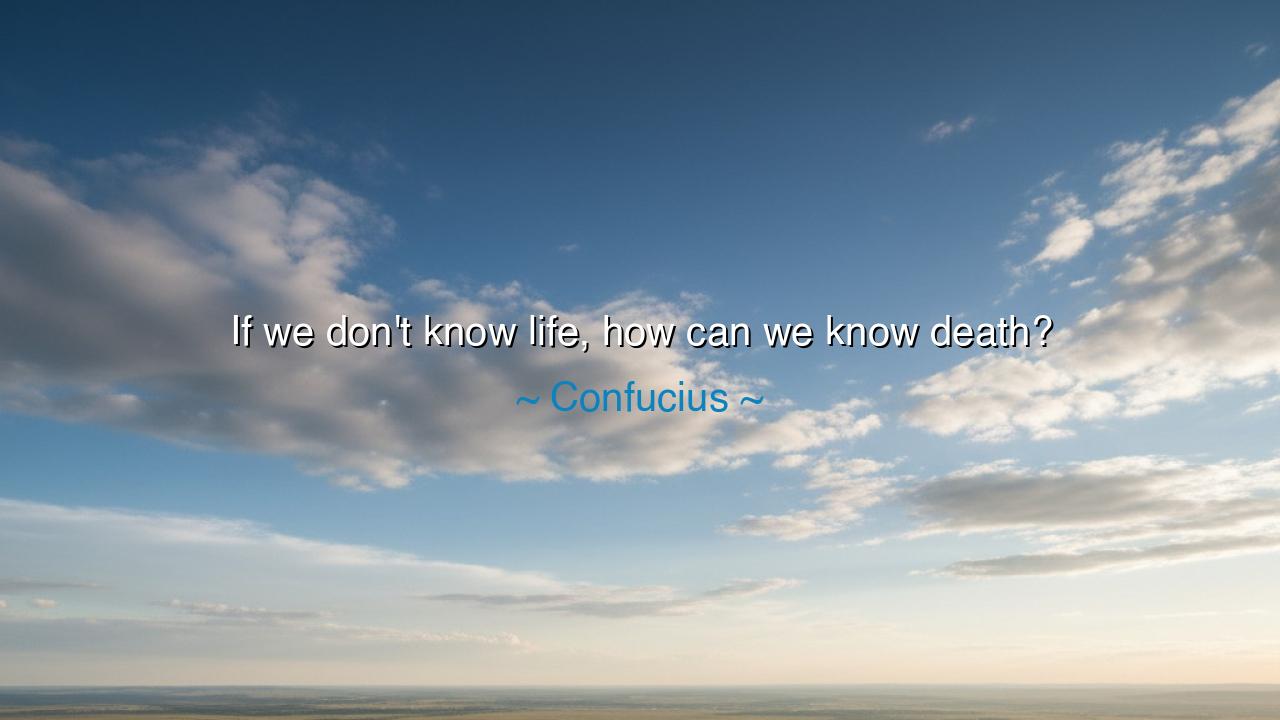
If we don't know life, how can we know death?






“If we don’t know life, how can we know death?” Thus spoke Confucius, the great sage of the East, whose words have guided the hearts of men for over two millennia. In this simple yet profound saying lies a truth as vast as the heavens — that understanding the mystery of death begins not with speculation about the beyond, but with wisdom about the present. To the Master, life itself was the great scripture from which all other truths flow. To know life — its rhythms, its duties, its joys and sorrows — is to come into harmony with the Tao, the eternal order. Only when one lives rightly can one face death rightly.
Confucius lived in an age of unrest, when kingdoms warred and men sought power without virtue. Many came to him with questions of heaven and the afterlife, asking what awaited the soul beyond the grave. But the Master, calm and unyielding, would turn their eyes back to the earth. “If we don’t know life, how can we know death?” he would answer — reminding them that to dwell on death while neglecting the duties of living is to abandon the sacred task placed before us. He saw that men feared death not because it was unknown, but because they had not yet learned how to live — how to love, to serve, to act with integrity. For when one’s life is in harmony, death is no terror; it is but another movement in the symphony of existence.
In this teaching lies a quiet yet heroic challenge: to understand life deeply — to live not as shadows passing through time, but as conscious beings who shape the world around them. To know life, in the Confucian sense, is to understand the nature of relationships — between parent and child, ruler and subject, friend and friend. It is to cultivate the virtues of humanity, righteousness, and wisdom in daily actions. When these are known and lived, the mind ceases to tremble before the unknown. Death becomes no more frightening than the setting of the sun, for he who has honored the daylight has no fear of the night.
Consider the life of Socrates, the philosopher of the West, whose teachings mirror the wisdom of Confucius. When condemned to die by poison, Socrates did not lament his fate. He spent his final moments teaching, reasoning, and comforting his disciples. He had lived fully and truthfully, and therefore he did not fear death. “The unexamined life is not worth living,” he said — and this truth stands beside Confucius’s teaching. For both sages understood that death’s riddle can only be answered by the one who has examined and honored life. The coward asks what comes after death; the wise man asks, “What am I doing with the time I have been given?”
Confucius’s words also remind us of the futility of mere speculation. What good is it to ponder the unseen when we do not yet understand what is before us? The man who studies the stars but neglects the earth beneath his feet cannot truly know the heavens. So too with life and death — the two are not separate, but woven together. To learn life — its purpose, its discipline, its beauty — is to glimpse eternity already. For in every act of compassion, in every moment of awareness, the soul touches something that does not perish. Knowing life is knowing eternity in disguise.
Throughout history, those who feared death most were those who clung least to life’s meaning. The tyrant fears death because his conscience is unclean. The greedy man fears death because his heart is empty. But the one who lives with honor, who brings goodness into the lives of others, walks calmly toward his end. The noble life is the preparation for the noble death. Confucius, in his quiet wisdom, sought not to give men answers about heaven, but to teach them how to build heaven here on earth — through virtue, respect, and the harmony of all living things.
Therefore, my child, take this teaching to heart: do not waste your days in fear of what follows. Instead, turn your attention to the life that breathes around you — the faces of those you love, the work that calls your hands, the truth that stirs your soul. Learn to live well: with courage, humility, and kindness. For death is not a problem to be solved, but a mirror that reflects the quality of your living. If you would know what awaits you beyond, first ask yourself how deeply you have loved, how honestly you have served, and how fully you have lived.
In this way, you will come to understand Confucius’s wisdom. To know life is to already begin to know death — not as an end, but as a continuation. Live, therefore, in awareness and virtue, and when your final hour arrives, you will not tremble. You will walk forward as one returning home, for you will have already touched the eternal through the way you have lived.






AAdministratorAdministrator
Welcome, honored guests. Please leave a comment, we will respond soon